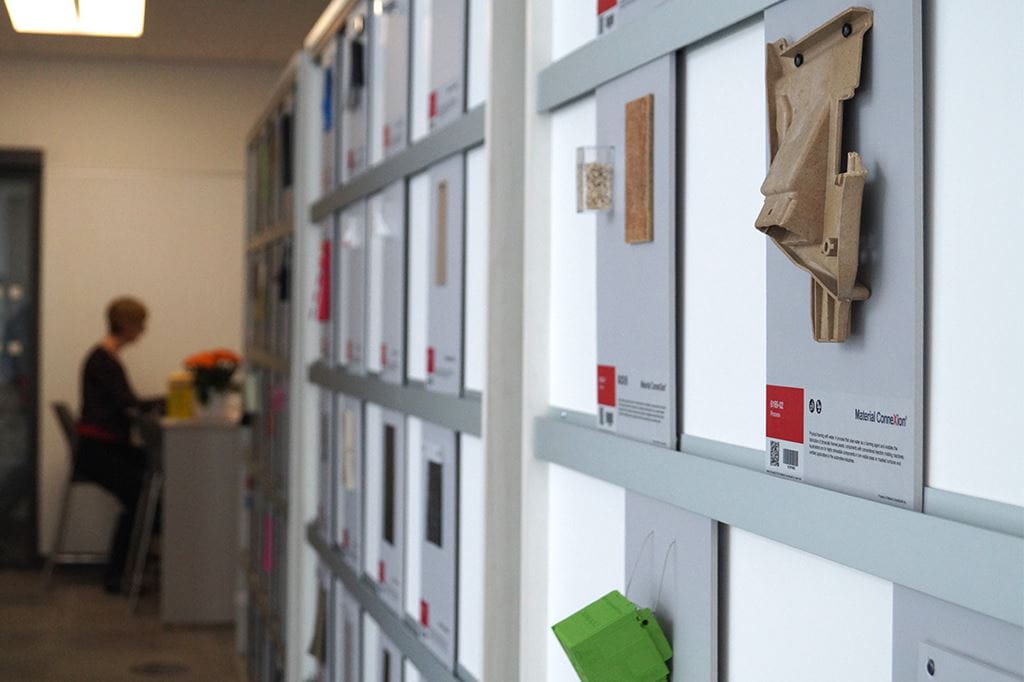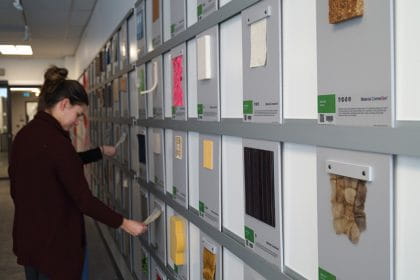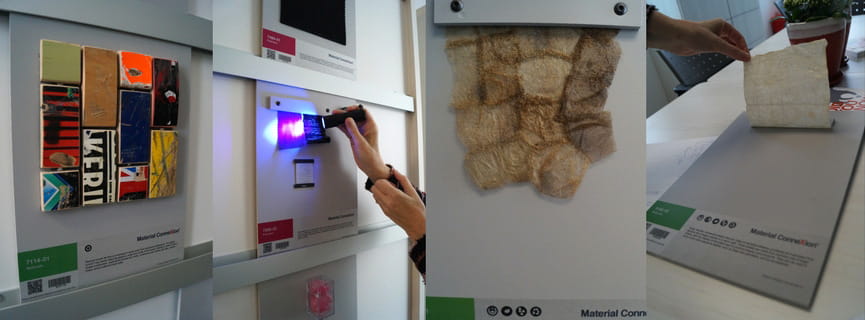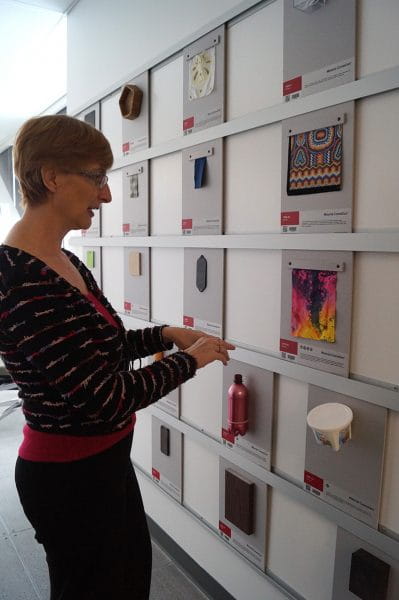
The materials to inspire
 by Keiko Kataoka – Jan 17, 2017
by Keiko Kataoka – Jan 17, 2017 A library in Sheridan’s new building at the Hazel McCallion Campus in Mississauga is missing a resource you’d expect to find: books. Instead, on its shelves are 500 future-forward materials and samples of material processes that aim to enhance the performance, aesthetics and sustainability of design projects.
The Material ConneXion Library as it’s called, is the first of its kind in Canada and puts Sheridan in the company of only 15 other post-secondary institutions worldwide. Other such libraries can be found at the Singapore University of Technology and Design, Ravensbourne in the United Kingdom and the Fashion Institute of Design and Merchandising in Los Angeles.

The idea to bring Material ConneXion to Sheridan came about after Faculty of Animation, Arts and Design (FAAD) Liaison Librarian Shelley Woods and Coop Advisor and FAAD Technologist Julie Nichols toured the flagship library in New York City. “It was clear to us on this trip that a library promoting innovation, creativity and interdisciplinary learning would be a natural fit for Sheridan,” says Woods.
A steering committee led by Director of Library and Learning Services, Joan Sweeney-Marsh, engaged professors and other representatives from Bachelor of Interior Design, Bachelor of Craft and design – Industrial Design and Architectural Technician/Technology programs. Identified program requirements from this group were considered by Dr. Andrew Dent of Material ConneXion in New York who compiled Sheridan’s collection.
“The minute students engage in a design process with three-dimensional form, decisions about materials become extremely consequential.” – Ronni Rosenberg
Walking up and down the aisles of the library you find yourself drawn to brightly-coloured samples of tile, sparkling crystals and unfamiliar items like hand-stitched, silkworm cocoons. Exposing students to this type of experiential learning will impact ideation, application and design, says Ronni Rosenberg, Dean of FAAD. She explains: “The minute students engage in a design process with three-dimensional form, decisions about materials become extremely consequential.” Feeling the veneer of a mosaic tile made of discarded skateboards and seeing how retroreflective yarn responds to different light sources can inspire infinite creative possibilities.

Patricia Buckley, Digital Curator and Special Collections Librarian who played an integral role in the coordination of the library doesn’t hesitate when asked about her favourite materials. She reaches for the bioleather on the top shelf of the ‘Naturals’ section. It’s described on the sample as a ‘tough, flexible translucent sheet made of bacterial cellulose, produced as a secretion from bacteria fed a sugary solution (pineapple juice) in a warm bath.’ “It’s beautiful to look at,” she says, “and being a typical librarian I looked it up in the Sheridan Library’s Material ConneXion database and learned it’s the offcut of a process used in Thailand to make beauty products.”

Like the bioleather, many materials in the library are considered sustainable. Others are recyclable, renewable or biodegradable. They’re organized by composition rather than intended use. “These aren’t here just to solve design challenges but for students to discover new ways to use them,” says Buckley. That discovery process will be fostered through peer-to-peer collaboration in the space as it will be staffed by Architectural Design and Interior Design students. The library team will be tracking how materials are used and are interested to learn of interdisciplinary opportunities that professors create.
“The materials aren’t here just to solve design challenges but for students to discover new ways to use them.” – Patricia Buckley
Even in its early stages the library has received an overwhelming positive response from students and faculty alike. And there are plans to introduce 250 additional materials this spring with the total collection amounting to 1,500 materials by 2018. “In this experience of bringing Material ConneXion to Sheridan I’ve learned the importance of truly understanding a material – its composition, makeup and properties – before implementing it in a design,” Buckley says. “Our collection is intended to inspire creativity with purpose – a fundamental Sheridan philosophy.”
Pictured at top of page: Sheridan’s Material ConneXion Library at the Hazel McCallion Campus in Mississauga. Photo by Keiko Kataoka.
Written by: Keiko Kataoka, Manager, Communications and Public Relations at Sheridan.
Media Contact
For media inquiries, contact Sheridan’s Communications and Public Relations team.





